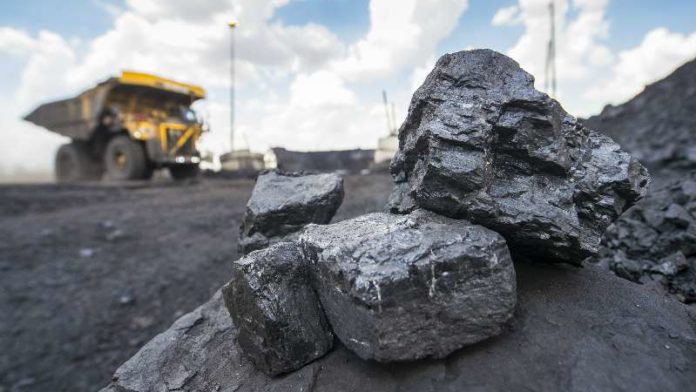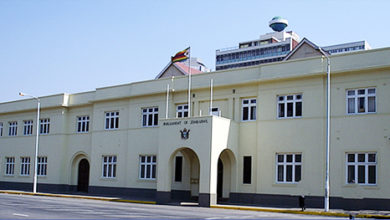Finance minister warns coal phase-out could cripple Zim’s economy

Calls for a worldwide phase-out of fossil fuels pose a significant challenge for Zimbabwe, as the country heavily relies on coal, which, if phased out, could lead to job losses and decreased investment, according to Minister of Finance and Economic Development, Professor Mthuli Ncube.
Professor Ncube’s comments come amid escalating global efforts to combat climate change, urging nations to shift from fossil fuels to cleaner renewable energy sources. However, he highlighted the financial constraints faced by poorer countries in addressing the climate crisis, exacerbating economic and household burdens, despite their lower carbon emissions compared to developed nations.
Speaking to delegates at the International Business Conference during the 64th edition of the Zimbabwe International Trade Fair (ZITF) in Bulawayo, the finance minister referenced the recent United Nations Climate Change Conference, known as COP28, held in the United Arab Emirates in 2023 where it was emphasised that fuels as the primary driver of climate change.
“There were increased calls for a global phase-out of the use of fossil fuels and that doesn’t make me happy,” admitted the finance minister.
He said Zimbabwe was “endowed with lots of coal and phasing out means job losses and investments.”
However, the minister highlighted that most Global South parties advocated for a gradual phasing down approach through the deployment of renewables to replace traditional fossil fuels.
“This is a just transition as opposed to an outright phase-out advocated by the Global North,” he said.
Prof Ncube said climate change finance and its implications for industrialisation and trade needed to be mobilised to address the climate crisis in low-carbon countries.
“Impacts of climate change are more pronounced in low carbon emitting countries like Zimbabwe. Countries will need to scale up investments that will transition economies towards renewable energy sources and protect vulnerable communities from impacts of climate change,” said Prof Ncube.
Unfortunately, scaling up climate change financing is beyond the capacity of weaker economies and countries, he added.
Prof Ncube said Africa’s carbon footprint is relatively small compared to other regions, citing that in 2020, the continent’s total greenhouse gas emissions were 1.5 billion metric tonnes of carbon dioxide, approximately three percent of global emissions.
As a result of these emissions, the minister said there was a global consensus that scaling the climate change action agenda requires climate change implementation, specifically climate finance, technology transfer and capacity building.
Meanwhile, Prof Ncube said the implications of climate change financing for industrialisation and trade are multifaceted and vary depending on the specific context or strategies adopted.
“Climate change financing encourages a shift from fossil fuel-based industries towards cleaner renewable energy sources such as wind, solar and hydro. This transition requires significant investments in renewable energy infrastructure technology impacting traditional industries relying on fossil fuels,” he said.
Prof Ncube stated that for local businesses to compete globally, they had to come up with creative solutions to cut carbon emissions in their supply chains.
He pointed out that to promote cleaner and more industrialised production in non-European Union countries, the EU Commission plans to implement the carbon border adjustment system beginning in 2026.
“The carbon price of imports has to be equivalent to the carbon price of domestic production and that the EU’s climate objectives are not undermined by conferring that a price be paid for the embedded carbon emissions generated in the production of certain goods imported into the EU,” Prof Ncube explained.
He said this innovation is aimed at fostering green industrialisation and would consequently affect trade, as in 2026 any country exporting to the EU should have a licence or record of how their goods were produced and how carbon was emitted.
“If it exceeds the set threshold, the exporting company will pay a penalty,” said the finance minister.
The finance minister said Africa has lots of potential for renewable energy sources, as it was endowed with some of the best solar sources in the world and ‘excellent’ wind sources particularly along this coastline.
For instance, Prof Ncube said Cape Verde invested in solar energy and currently could achieve 80 percent supply of electricity from solar and wind energy.
“Developing energy sources in Africa could help reduce the continent’s reliance on fossil fuels and reduce carbon emission as well as creating new opportunities for economic development, job creations and poverty reduction.”
Prof Ncube said Africa needs new innovative ways to also utilise its forests such as the Congo Basin Rainforest, the Guineo Congo, the East African Coastline, the Miombo Woodlands (inZambia), the Sudanian Savanna and Zimbabwe forests.
“These forests have a significant role in the global carbon cycle and have potential to play a major role in carbon trade,” he said.
Despite this ‘huge’ potential, Prof. Ncube lamented that the current value of carbon trading in Africa is relatively low, contributing only two percent of global carbon market trade.
“It’s not only about the two percent, it’s also the pricing. The pricing is way below global prices and the pricing of these carbon credits is controlled by a tightly neat group of institutions, individuals and special auditors, whose names we have never heard of. It’s not KPMG, EY, but specialised auditors who control the specification of these markets.”
The finance minister added climate finance would help countries reduce greenhouse gas emissions by funding renewable power and assist communities adapt to climate change impacts.
He said by introducing climate change resilience seeds, many farmers continue producing foods and earning income despite droughts or extreme weather conditions, challenging SEEDCO to consider this.






